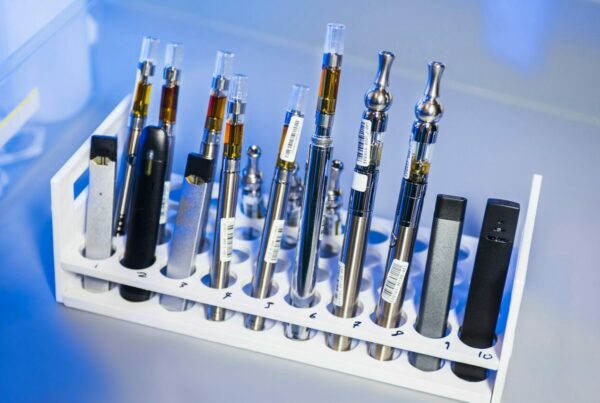N, N-Dimethyltryptamine (DMT) is a compound commonly found in both plants and animals, known for its potent yet short-lived psychedelic effects upon ingestion.
The growing body of evidence suggests that DMT, which naturally exists within the human body, plays significant roles in the peripheral and central nervous systems, potentially serving as a neurotransmitter.
DMT can trigger strong psychedelic effects, but generally, it doesn’t cause many negative side effects, except potentially for cardiovascular issues when administered in high doses via injection.
Let’s explore DMT and its diverse roles, which range from recreational use to its promising potential in scientific research and therapeutic applications.

A Brief Introduction to DMT: What is it?
| Aspect | Details |
| Name | N, N-Dimethyltryptamine (DMT) |
| Classification | Indole alkaloid |
| Occurrence | Naturally found in a variety of plants and animals |
| Psychoactive Effects | Intense, short-lived psychedelic experiences upon ingestion. |
| Method of Consumption | Can be smoked, injected, or taken orally. |
| Duration of Effects | Brief duration, typically between 5 to 30 minutes. |
| Chemical Structure | Comprises a tryptamine core with two methyl groups attached to the amine nitrogen atom. |
| Metabolism | Rapidly metabolized by the body, broken down by monoamine oxidase (MAO). |
| Cultural Use | Traditionally used in various ceremonial and shamanic rituals by indigenous cultures. |
| Other names | Dimitrifantasiabusinessman’s tripBusinessman’s special45-minute psychosisspiritual molecule |
The Role of DMT in Mental Health
N, N-Dimethyltryptamine (DMT), a compound known for its powerful psychedelic effects, is drawing attention for its potential implications for mental health. Despite its traditional association with intense visionary experiences, recent research suggests a connection between DMT and mental well-being.
Effects on Psychological and Emotional Well-being
DMT, known for its psychedelic effects, can trigger profound emotional reactions and alter states of consciousness. These qualities could pave the way for therapeutic approaches to address mental health issues, assist emotional processing, and provide new perspectives on personal traumas.
Neuroplasticity and Brain Function
Research suggests that DMT can impact neuroplasticity, enhancing the brain’s ability to adapt and reorganize. Investigating its influence on synaptic plasticity and neural connectivity might offer potential therapies for conditions linked to neural maladjustment.
Potential Therapeutic Use for Mental Health Disorders
Early studies emphasize DMT’s potential in treating disorders such as depression, addiction, and PTSD. Its ability to induce mystical or spiritual experiences could offer a novel approach to psychotherapy and help reframe negative thought patterns.
The investigation of DMT’s natural presence in the body highlights its significance in mental health resilience, stress response, and overall psychological wellness. Understanding how the body regulates its internal DMT levels could lead to new therapeutic strategies.
DMT and Mental Health Disorders
| Mental Health Disorder | Description | Effectiveness of DMT | Potential Benefits |
| Depression | Defined by persistent sadness, disinterest, and reduced motivation due to a mood disorder | Initial research suggests DMT might alleviate symptoms by inducing deeply emotional experiences. | DMT’s rapid onset and ability to evoke transformative experiences could provide innovative therapeutic methods for reframing negative thought patterns and promoting emotional processing |
| Post-Traumatic Stress Disorder (PTSD) | A mental health disorder triggered by traumatic events, leading to flashbacks, intense anxiety, and invasive thoughts | Preliminary research indicates DMT’s potential to manage symptoms by inducing spiritual or mystical experiences that could help patients reframe traumatic memories | DMT’s capacity to induce altered states of consciousness might help facilitate emotional processing and provide a fresh perspective on traumatic experiences |
| Addiction | A complex disorder characterized by compulsive engagement in rewarding stimuli despite adverse consequences | Some research suggests DMT could disrupt addictive patterns and decrease cravings for substances | DMT’s ability to induce powerful and transformative experiences might assist individuals in altering their behavioural patterns and addressing the root causes of their addiction |
Approach to Using DMT
DMT, a substance renowned for creating short but potent psychedelic experiences, can be taken in a variety of ways. The chosen method of use often hinges on the desired intensity and duration of the trip.
Smoking:
When DMT is smoked using a pipe or vaporizer, it’s crucial to keep a check on the temperature to avoid overheating and burning the compound. The onset of a psychedelic journey is almost instantaneous when DMT is smoked, typically lasting between 5 to 15 minutes.
Oral Intake:
Taking DMT orally triggers slower effects which tend to linger for much longer, often several hours. This is caused by the slower metabolic breakdown of DMT when ingested with an MAOI.
Injection:
DMT can be directly injected into the bloodstream for quick and intense effects.
This approach results in an immediate and powerful experience, but it necessitates precise dosage and carries greater risks.
Insufflation (Snorting):
Snorting DMT results in a slower onset of effects compared to smoking, but it could potentially offer a more prolonged experience.
Sublingual or Buccal Administration:
When absorbed through the oral mucosa, this method presents an alternative to smoking and yields a longer, though less intense, experience.
Determining Therapeutic Dosage: N, N-Dimethyltryptamine (DMT)
For smoking, the suggested dosage ranges from 20 to 40 mg, while for intravenous use, the recommended dosage is 0.2 to 0.4 mg per kg of body weight. These dosage guidelines are primarily intended for clinical research and are particularly pertinent for intravenous use.
- Higher doses administered intravenously have been associated with intense visuals, temporary disorientation, and a combined state of anxiety and euphoria
- Interestingly, lower doses have yielded less favorable effects
- Recreational doses of smoked DMT generally vary from 40 to 50 mg, with some instances even reaching up to 100 mg
- Various doses of intravenous Individuals who have experienced near-death encounters associated with DMT (7, 14, 18, and 20 mg solutions) have reported enduring improvements in their psychological well-being.
Availability of DMT
ProductsOsmosis – 4-ACO-DMT Ethereal Essence Tincture
This tincture is said to contain 4-Acetoxy-N, N-dimethyltryptamine (4-AcO-DMT), a type of DMT. Tinctures are liquid extracts designed for oral intake, and this specific product could offer a distinctive experience compared to traditional DMT.
Lucid Supply Co. – 5-MeO DMT Vaporizer
This product is a vaporizer that delivers 5-Methoxy-N, N-dimethyltryptamine (5-MeO-DMT). The active ingredient, 5-MeO-DMT, is renowned for its potent, transformative, and often fleeting experiences.
Integral Alchemist – Acacia – 1ml DMT Vape Cartridge
The DMT vape cartridge from Integral Alchemist comes pre-loaded with N, N-Dimethyltryptamine and is likely aimed at individuals who prefer a discreet and convenient method of DMT consumption.
Deadhead Chemist – 5-Meo-DMT Cartridge
This cartridge houses 5-Methoxy-N, N-dimethyltryptamine (5-MeO-DMT), a compound renowned for its deep and potent effects.
Potential mental health benefits might be linked to personal growth, spiritual experiences, or therapeutic applications intended to enhance emotional well-being.
Deadhead Chemist – N, N DMT Cartridge
Another offering from Deadhead Chemist, this cartridge carries the traditional N, N-Dimethyltryptamine. Cartridges provide a user-friendly method of DMT administration, ensuring a more consistent and stable experience.
Concluding Remarks
The usage of N, N-Dimethyltryptamine (DMT) in
How to choose the right DMT product for mental health purposes?
Mental health therapy is a complex yet intriguing journey. The ability of certain compounds to facilitate powerful, albeit brief, psychedelic experiences opens up new therapeutic avenues.
Preliminary research points towards its potential usefulness in emotional processing, personal development, and possibly
The substantial influence of mental health therapy necessitates careful deliberation and responsible use.
Those interested in responsibly exploring DMT products can turn to reliable sources such as the Shrooms Online Canada Online Dispensary for guidance and a variety of options.
Frequently Asked Questions:
How do various DMT products differ in their impact on mental health?
For instance, vaporizers can produce effects quickly, while tinctures or vape cartridges may offer more controlled and consistent doses.
Incorporating derivative compounds or 5-MeO-DMT can result in varying degrees of intensity and diverse effects on mental health.
These nuanced differences underscore the importance of selecting a DMT product based on individual preferences and mental health goals.
Can DMT contribute to enduring changes in mental health and personal growth?
Anecdotal evidence suggests that DMT-induced experiences could have long-term effects on mental health and personal development.
Highly profound or transformative experiences, such as those resembling near-death experiences, are often associated with reports of sustained positive changes in psychological health and personal development.
Though these experiences are intense and transient, they often promote self-exploration, spiritual revelations, and a sense of unity or enlightenment.
People frequently report a refreshed perspective on life, improved emotional resilience, and an enhanced appreciation for life following these experiences.
What’s the optimal strategy for utilizing DMT for mental health purposes?
It’s paramount to make well-informed decisions, which include thorough research and comprehension of the compound’s effects.
Advice from mental health professionals or seasoned users can provide valuable insights into potential risks and advantages.
Recognizing personal tolerance and mental readiness is also vital, as is ensuring a supportive and safe environment for the experience.
What differentiates DMT from other psychedelics like psilocybin or LSD in mental health treatment?
DMT differs from other psychedelics such as psilocybin and LSD in terms of effects, intensity, and duration. It has a shorter duration.
The high intensity and brief duration of experiences induced by DMT require unique therapeutic approaches in mental health that are distinct from those for longer-lasting psychedelics.
Recommended Additional Reading:

 Explore DMT in mental health treatment
Explore DMT in mental health treatment



